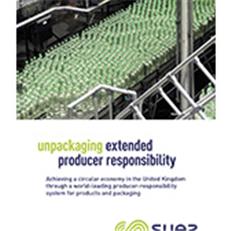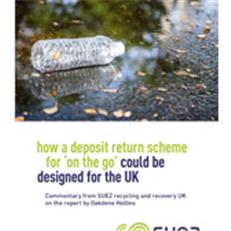Policy “calculator” will help councils estimate impact of resources and waste strategy on services
The Resources & Waste Policy Impact Calculator is being developed by Anthesis Group, the sustainability services and solutions provider, and SUEZ, together with support from LARAC, Project Integra and the Kent Resource Partnership.
The policy impact calculator, which will be made available to download free of charge, will provide a user-friendly interface to help local authorities estimate the potential financial and operational implications of the different deposit return scheme (DRS) scenarios, and full net cost recovery extended producer responsibility (EPR) proposals, on their individual services.
A major shake-up of producer responsibility and recycling and waste collection systems has been proposed by Government as part of its recent Resources & Waste Strategy, although Defra left much of the detail of these policies to various consultation documents due to be published imminently.
However, it is understood by many in the industry that the deadline for responses to the consultation documents, once published, could be halved from the standard 12 weeks to just six weeks, as a result of other parliamentary pressures – making the policy impact calculator all the more vital to expedite informed responses.
It is anticipated that the calculator will be made available within three weeks of the publication of the consultation documents, which will allow time for the model to be adjusted for the specific details in the documents.
By inputting basic service data unique to each local authority, or by using the default information embedded within the tool, the calculator will produce a number of bespoke indicative outputs for each authority which include, for example:
- The potential volume of material removed from kerbside collection services by deposit return schemes and the subsequent financial and operational impacts
- Estimates of the likely tonnages of extended producer responsibility-obligated materials in household streams
- The level of financial support, which might come from additional extended producer responsibility funding, that each authority may receive towards the costs of collection
- The gap between current performance and likely future targets
The models, data and underlying assumptions used to generate these figures will be clearly explained within the policy impact calculator.
LARAC will notify its members as soon as the calculator is live and SUEZ and Anthesis will promote it to other local authorities through appropriate networks.
Technical Development Director at SUEZ recycling and recovery UK, Stuart Hayward-Higham, said: “With such a radical potential policy shake-up, there is significant uncertainty over the impact of various different scenarios and models for deposit return and extended producer responsibility respectively. Confusion around the potential impacts of these major policy instruments may make it difficult for councils to make an informed response to these vital consultations, particularly given the condensed timescales, which is why we have backed Anthesis in developing this useful tool and contributed our own data to help inform the discussion.”
Beth Simpson, Principal Consultant at Anthesis said: “Accurately assessing the potential impacts around future policy is a crucial undertaking for local authorities. With major reforms now a near-term prospect off the back of the government consultations, it’s vital that authorities respond in an informed, constructive manner, with the evidence to support their views. It’s been fantastic to work with the partners and create a highly useful impact assessment tool to support authorities as they navigate their way through potential large changes to their operations.”
Lee Marshall, CEO LARAC said: “LARAC was keen that members responded to the consultations on DRS and EPR and this tool will be key for them to submit responses with good evidence on the impact on local authorities of a DRS.”
Vicky Beechey from Project Integra said: “Project Integra is pleased to have had the opportunity to support the development of this calculator. We believe it will assist the Partnership to more comprehensively identify and understand the implications of the proposed EPR and DRS systems on waste management in Hampshire. We will be using the calculator to support our responses to the upcoming consultations and hope that other Local Authorities will take advantage of this work to do the same.”
Paldeep Bhatti from Kent Resource Partnership said: “The role of extended producer responsibility and possible introduction of a deposit return scheme are likely to have fundamental impacts to the 13 Kent councils’ operations and finances. The policy impact calculator will help us understand these impacts, as well as provide the latest data for us to reflect in our upcoming consultation responses to Defra.”
Keywords
Report | Unpackaging extended producer responsibility


